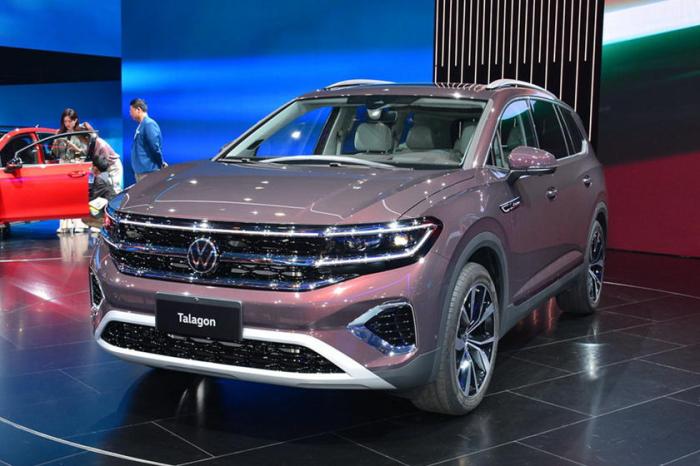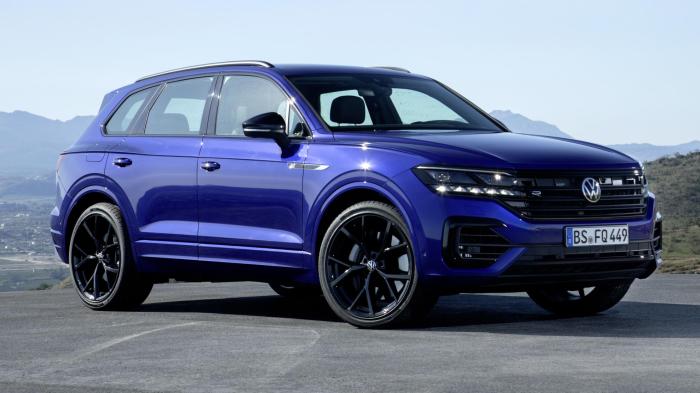Which volkswagen suv is bigger – When it comes to choosing the right Volkswagen SUV, size and space are crucial factors to consider. With a range of models available, from the compact T-Cross to the spacious Atlas, finding the one that meets your needs can be a challenge.
This guide will delve into the dimensions, interior space, and features of different Volkswagen SUV models to help you make an informed decision.
From comparing length, width, and height to assessing seating capacity and cargo space, we’ll provide a comprehensive overview of each SUV’s size and practicality. Additionally, we’ll explore the engine power, performance, and technological advancements that enhance the driving experience.
Comparison of Volkswagen SUV Dimensions

Volkswagen offers a range of SUV models, each with its own unique dimensions. These dimensions affect the overall size and interior space of each SUV, making it important to consider them when choosing the right model for your needs.
When it comes to spaciousness, the Volkswagen Atlas is the largest SUV in the lineup. It offers ample room for passengers and cargo, making it a great choice for families or those who need extra space. Volkswagen is known for its engineering expertise, and the Atlas is no exception.
But if you’re wondering whether Volkswagen makes Audi, the answer is yes. Volkswagen acquired Audi in 1964 , and the two brands have been working together ever since. This collaboration has resulted in some impressive vehicles, including the Volkswagen Atlas.
Volkswagen SUV Dimensions Table
The following table compares the dimensions of different Volkswagen SUV models:
| Model | Length (in) | Width (in) | Height (in) | Wheelbase (in) |
|---|---|---|---|---|
| Volkswagen Tiguan | 185.1 | 73.2 | 66.3 | 108.3 |
| Volkswagen Tiguan Allspace | 191.3 | 73.2 | 66.3 | 110.9 |
| Volkswagen Atlas | 198.3 | 78.3 | 70.1 | 117.3 |
| Volkswagen Atlas Cross Sport | 195.5 | 78.3 | 67.8 | 117.3 |
How Dimensions Affect Size and Interior Space
The length of an SUV affects its overall size and the amount of cargo space it offers. The width of an SUV affects the amount of shoulder room and elbow room in the cabin. The height of an SUV affects the amount of headroom in the cabin and the ground clearance.
The wheelbase of an SUV affects the amount of legroom in the cabin.
Interior Space and Seating Capacity
Volkswagen SUVs offer a range of interior space and seating capacities to suit different needs. From the compact T-Cross to the spacious Atlas, there’s an SUV to accommodate every family size and lifestyle.The
If you’re wondering which Volkswagen SUV is bigger, the answer is the Atlas. It’s the largest SUV in Volkswagen’s lineup, with three rows of seating and plenty of cargo space. But did you know that Volkswagen also owns Porsche? Does Volkswagen own Porsche ? Yes, that’s right.
Volkswagen acquired Porsche in 2012, and the two companies have been working together ever since. So, if you’re looking for a big Volkswagen SUV, the Atlas is a great choice. And if you’re curious about Volkswagen’s relationship with Porsche, be sure to check out the link above.
T-Cross, Volkswagen’s smallest SUV, offers five seats and a surprisingly spacious interior for its size.
With 38.4 inches of legroom and 40.4 inches of headroom in the front, and 37.4 inches of legroom and 38.6 inches of headroom in the rear, the T-Cross provides ample space for passengers to stretch out and relax.Moving up to the Tiguan, Volkswagen’s compact SUV, offers five or seven seats depending on the trim level.
The five-seat Tiguan has 41.2 inches of legroom and 39.8 inches of headroom in the front, and 36.1 inches of legroom and 37.8 inches of headroom in the rear. The seven-seat Tiguan adds a third row with 29.6 inches of legroom and 37.3 inches of headroom, providing additional seating capacity for larger families.The
Atlas, Volkswagen’s largest SUV, offers three rows of seating for up to seven passengers. The Atlas has 41.3 inches of legroom and 39.9 inches of headroom in the front, 37.6 inches of legroom and 38.3 inches of headroom in the second row, and 33.7 inches of legroom and 38.1 inches of headroom in the third row.
If you’re torn between Volkswagen’s spacious SUVs, you might also be curious about the upcoming launch of the Volkswagen Polo in India. To stay updated on the latest news and release date, click here . Once you’ve made your decision, you can explore which Volkswagen SUV is bigger to suit your specific needs and preferences.
The Atlas’s spacious interior and ample legroom make it a great choice for families who need plenty of room to spread out.In terms of cargo space, the T-Cross offers 13.2 cubic feet of cargo space behind the rear seats, which can be expanded to 45.9 cubic feet with the rear seats folded down.
The Volkswagen Atlas is a popular SUV, but how does it compare to other Volkswagen SUVs? If you’re curious about the reliability of the Atlas, check out this article: are volkswagen atlas reliable . Once you’ve got the reliability question answered, you can get back to figuring out which Volkswagen SUV is the best fit for your needs.
The Tiguan offers 12 cubic feet of cargo space behind the third row of seats, 37.6 cubic feet behind the second row of seats, and 65.7 cubic feet with both rows of seats folded down. The Atlas offers 19.5 cubic feet of cargo space behind the third row of seats, 55.5 cubic feet behind the second row of seats, and 96.8 cubic feet with both rows of seats folded down.Overall,
Volkswagen SUVs offer a range of interior space and seating capacities to suit different needs. From the compact T-Cross to the spacious Atlas, there’s an SUV to accommodate every family size and lifestyle.
Engine Power and Performance

Volkswagen SUVs offer a range of engine options, each providing a unique driving experience. These engines vary in size, power output, and torque, which significantly impact the performance and capabilities of each SUV.
Engine Specifications
The engine specifications of different Volkswagen SUV models are as follows:| Model | Engine Size | Horsepower | Torque ||—|—|—|—|| T-Cross | 1.0L TSI | 115 hp | 175 Nm || T-Roc | 1.5L TSI | 150 hp | 250 Nm || Tiguan | 2.0L
TSI | 190 hp | 320 Nm || Tiguan Allspace | 2.0L TSI | 245 hp | 370 Nm || Touareg | 3.0L V6 TDI | 286 hp | 600 Nm |
Driving Experience, Which volkswagen suv is bigger
The engine power and performance directly influence the driving experience of each Volkswagen SUV. The T-Cross and T-Roc, with their smaller engines, provide adequate power for everyday driving, while the Tiguan and Tiguan Allspace offer more responsive acceleration and better handling on highways.
The Touareg, with its powerful V6 diesel engine, delivers exceptional performance, making it ideal for towing and off-road adventures.
If you’re in the market for a spacious SUV, Volkswagen has a few options that might fit the bill. The Atlas and the Tiguan are both popular choices, but which one is bigger? To find out, you can check out Volkswagen’s website for more information on both models.
There, you can compare their dimensions, features, and pricing to decide which one is the best fit for your needs.
Features and Technology: Which Volkswagen Suv Is Bigger
Volkswagen SUVs offer a range of features and technologies designed to enhance the driving experience and convenience for occupants. These features include advanced safety systems, user-friendly infotainment systems, and a suite of driver-assistance technologies.
The safety features in Volkswagen SUVs include airbags, anti-lock brakes, electronic stability control, and a variety of driver-assistance systems such as lane departure warning, blind-spot monitoring, and adaptive cruise control. These features work together to protect occupants in the event of a collision and to help drivers avoid accidents.
Infotainment Systems
The infotainment systems in Volkswagen SUVs are designed to provide drivers and passengers with a variety of entertainment and information options. These systems include a touchscreen display, a variety of audio inputs, and support for Apple CarPlay and Android Auto.
The infotainment systems also offer a variety of apps, including navigation, weather, and news.
Driver-Assistance Technologies
Volkswagen SUVs offer a variety of driver-assistance technologies designed to make driving easier and safer. These technologies include adaptive cruise control, lane departure warning, blind-spot monitoring, and rear cross-traffic alert. These technologies work together to help drivers stay in their lane, avoid collisions, and safely navigate intersections.
Other Amenities
In addition to safety features, infotainment systems, and driver-assistance technologies, Volkswagen SUVs offer a variety of other amenities designed to enhance the driving experience and convenience for occupants. These amenities include heated seats, a sunroof, and a premium sound system.
Last Word
Ultimately, the best Volkswagen SUV for you depends on your specific requirements and preferences. Whether you prioritize interior space, driving performance, or advanced features, our comparison guide provides the insights you need to make an informed choice. By considering the factors discussed in this article, you can find the Volkswagen SUV that perfectly fits your lifestyle and needs.